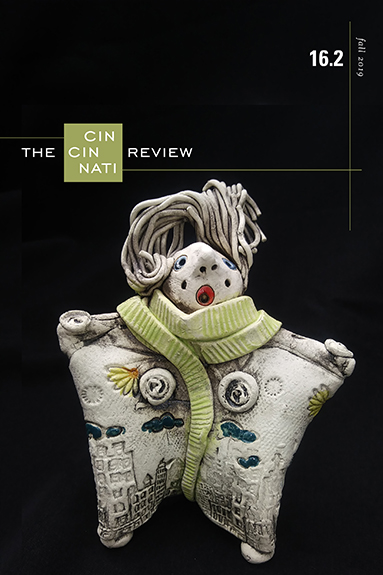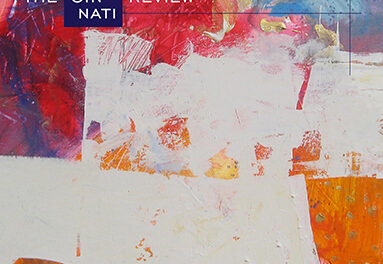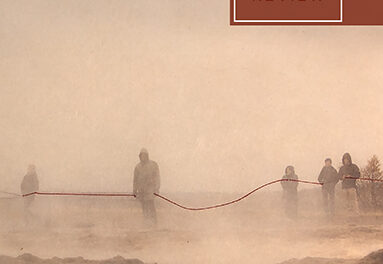The Canadian comes to us with blue-black eyes and a forehead like the cliffs of Santorini. We think that he is Greek, but the Canadian is quick to correct us. He is Jewish, and he is standing in my doorway, and he wants to know the way to Giorgos’s taverna.
Yianni looks the Canadian up and down. “Who are you,” he says, “and how have you come here to this island of Chios?” Yianni has just lit a new cigarette, and he had been on the cusp of telling us where Madga found her missing cow when the Canadian approached us. Yianni does not like to be interrupted by strangers.
In a voice as dark as honey, the Canadian says, “I have come from Montreal,” and he takes off his hat and bows a little stiffly. He is very tall, and when he straightens, his head brushes the lowest tendril of my wife’s bougainvillea growing over the doorway. We notice a thick blue notepad sticking out of his pocket.
Panos eyes the notepad, and he glances in my direction. “I see,” he says, “And what will you do here?”
“I have come to work for Giorgos,” he says. “But I am a poet.”
We stop and look at each other, Yianni, Panos, and me. All the foreign boys who come to be waiters for Giorgos tell us they are poets. We do not know how Giorgos finds these boys, but we are always very gentle with them, and we tell them that Greece already has many thousands of poets, good ones, who have been working diligently for thousands of years, and the poet-boys ignore us and we watch them closely and they do not write any poetry anyway.
So when the Canadian tells us he will work for Giorgos, we feel just a little bit guilty. Should we warn him? We debate this after we give the Canadian directions and he walks away.
Panos thinks we should. “He was so polite to us, so courteous,” he says. “Remember the way he took off his hat and bowed to you, Yianni, as if you were an elder? They must be very courtly in Canada.” Panos is an idiot. He has a stupid wife and seven stupid children, and he used to work in a shipyard until they dropped an anvil on his foot and made him lame.
“We owe him nothing,” Yianni says. He takes a long drag off his glowing cigarette and throws it to the ground as if it disgusts him. “He is a xénos. And I am tired of these false student-poets. They are only after our daughters.” (He is right there: the last not-poet we caught half-naked in a hayloft with Toula’s youngest daughter.)
“But it was different with this Canadian,” Panos says. “He said he was a poet in the way a man says he is a fishmonger or a barber. He said it, and we did not laugh at him.”
Panos and Yianni both turn to me now. This is normally the point in the conversation at which I am expected to speak. You might say I’m the arbiter.
I take my cap off its hook on the wall. I tell them that I think we had better go see how the Canadian does.
* * *
When a new boy comes to work for Giorgos, we always go down to watch. The same thing happens every time. The boy comes to us from London or Pittsburgh or New York, where he is studying law or finance or something where you never get dirty and you never learn how to sweat. He will seem too confident as he greets us, and by the time he brings us our orders his shirt will already be soaked through with sweat.
But when we come to Giorgos’s taverna, the Canadian is solemn and dry. He smiles, but only with his eyes. “Good morning,” he says, and he shows us to our seats. He brings us water glasses with dignity, as if the weight of those glasses means something to him, as if it is a gift to hand us this water.
I look around at all the empty tables. We are probably the only customers the Canadian will see all day. Nobody likes coming to this side of the island—the lonely side, by the factory that we closed down after the war. Giorgos was in America then, and he does not remember the war or the factory, the bodies that we buried there.
And that is the other reason no one comes to Giorgos’s taverna: nobody likes Giorgos. We didn’t like him when we were children and he was the boy who threw sticks at our goats. Our mothers clicked their tongues at him, and our fathers shook their heads. “He is a strange boy,” they said. We all shook our heads when he left for America, and we shook our heads when he came back. “His uncle never should have left him that taverna,” we all said to each other. “He is as good as a stranger to us, a xénos.”
But the Canadian does not know any of this, or if he does, he pays it no attention. He does not know that when Giorgos first came home, all the girls on the island went sniffing after him with their long-tanned legs and their lipstick and their Essence of Rose, the perfume they had been saving just to snare a rich husband. (I asked my sister about this once. She said rich men like the scent of roses because roses are best cultivated by a hired hand.) The Canadian does not know we thought Giorgos was rich, that we knew he had been a janitor in Detroit but we knew even janitors are rich in America. And the Canadian was not there when Giorgos’s grandmother told us that he had lost all his money in the American casinos, and he did not see her put her head in her hands.
Perhaps it is for this reason that the Canadian is not sweating when he pulls out the blue notepad. It is creased and worn and looks like it has been with him since boyhood. Panos nudges me. “Look!” he whispers. “He is writing us a poem!” But the Canadian just stands there with raised eyebrows and a poised pen, waiting for our order.
. . .
For more of this story or other great fiction in issue 16.2, order now in our online store. Digital copies are only $5!










